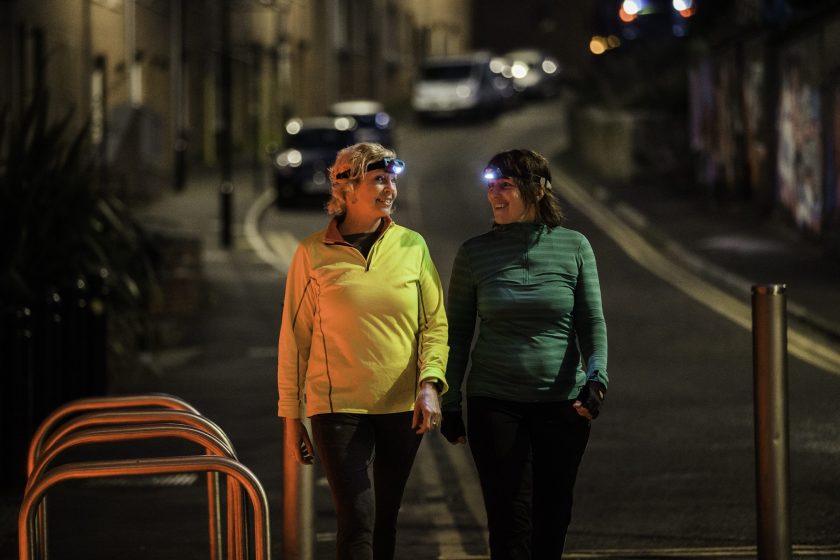
For safety, walk with a partner and use reflective gear and safety lights. Getty Images
No matter when you lace up and head out, walking is a win for your physical and mental health. But if you’re someone who’s always on the hunt for a good night’s sleep, experts say there’s a strong case for saving your daily miles before bed.
Sleep problems are ubiquitous. According to the Cleveland Clinic, about one in three adults worldwide experience symptoms of insomnia, including mood swings, difficulty concentrating, and difficulty remembering things. Behavioral factors like drinking coffee, using blue light devices, drinking alcohol, or eating right before bed can affect insomnia, says Neil Paulvin, DO, a New York-based longevity and regenerative medicine doctor.
Biological factors can also keep you awake at night. Many health conditions can affect your sleep, and conditions that cause chronic pain, conditions that make breathing difficult, and conditions that increase urinary frequency can also affect your sleep, just to name a few factors, says Paulvin.
According to Paulvin, an evening walk is a good practice before bed for anyone ready to challenge the wide range of factors that keep us up at night. Below, he explains the benefits of taking a walk before bed. Plus, your four best practices to follow on your first twilight ride.
The benefits of walking at night
While walking has a lot to offer regardless of the time of day, Paulvin says there are some specific advantages when it comes to strolling at night. In general, walking is great for longevity and helps you sleep, says Paulvin.
Walking before bed will decrease stress and calm the sympathetic nervous system to help you sleep, he explains. Since melatonin, the sleep hormone, is stimulated by darkness, stepping away from screens and artificial lights will send your body the message that it’s time to get ready for some much-needed R&R.
Research shows that walking before bed can help you fall asleep faster and can even improve your sleep quality and efficiency (the amount of time you spend sleeping in bed).
How to Make the Most of Your Night Walk
Before you grab your walking shoes and head out for a starry walk, Paulvin has some pro tips for making sure your pre-bed walks help (and don’t hurt) your sleep. Below, he offers four guidelines for planning tonight’s melatonin-producing walk.
1. Keep it light
Here’s your mantra for this walk: Take it easy. If your goal is to sleep, this is not the time to engage in rigorous exercise. The body takes longer to cool down after intensive workouts, so save them for earlier in the day, says Paulvin.
2. Remember, safety first
I recommend walking with a partner, wearing reflective gear and safety lights, and staying away from traffic whenever possible, says Paulvin. I would also plan your route in advance and try to choose a route that you know well, that you have ridden in daylight. This way, you know the path and will be less likely to run into unforeseen obstacles.
If you have to hike alone, text a friend or family member your route and ask them to check on you when you get home. You can also use tools like Find My to let loved ones track your location.
3. Leave your headphones at home
In terms of technology, I would bring your cell phone, but you would lose the music, says Paulvin. Because your vision is inhibited in the dark, you want the best of your other senses. Plus, going without a podcast or music will ensure that whatever you’re listening to doesn’t get stuck in your head before bed. After all, nothing will make you hate your favorite song more than hearing it on repeat in your head at 3 am.
4. Leave 90 minutes between the end of the walk and bedtime
Paulvin doesn’t recommend going for a walk immediately before hiding under the covers.
Based on research, I recommend leaving at least 90 minutes between the time you end your walk and your bedtime, he says. Core body temperature increases during exercise and it takes about 90 minutes for the temperature to return to baseline.
Allow plenty of time to shower, get ready for bed, and read under the covers. Avoid bright, harsh lighting and stimulating TV shows or movies. After all, you wouldn’t want to undo all the effects of your melatonin walk.
#walk #bed #secret #nights #sleep
Image Source : fortune.com
